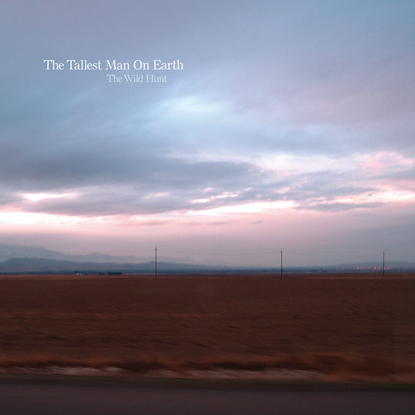Pesky comparisons to Bob Dylan have dogged Kristian Matsson throughout his short career as the Tallest Man on Earth. In 2006, his self-titled EP introduced a singer with that familiar croak, a songwriter with a folk-revival revival sensibility, and a guitar player with an impressively agile fingerpicking style. The next year, his full-length debut, Shallow Grave, expanded nicely on those ideas, buffing away some of the rougher edges but emphasizing fully realized and beautifully evocative songs. The Wild Hunt, the second Tallest Man on Earth album and first for Dead Oceans, makes a few specific nods to Dylan at his most earnest and bare-- including a reference to "boots of Spanish leather" on "King of Spain". Ultimately, though, Matsson interprets Dylan, just as Dylan himself interpreted Guthrie. More to the point, Matsson translates him into the Scandinavian countryside, where he sings about changing seasons and quiet, lonely places far from cities. His lyrics are rough and often ragged, more concerned with evoking aching emotions than with making explicit sense. But that coded aspect only makes him sound more urgent, as if he's trying to convince you of something he couldn't possibly put into words.
As with previous albums, The Wild Hunt features mainly voice and guitar, and in this intimate, austere setting-- where the banjo on the title track sounds like an indulgence-- Matsson coaxes a wide range of colors from that limited palette, whether it's the testiness of "You're Going Back" or the exuberance of "King of Spain". His grounding in American Southern traditions is apparent: While not a blues musician per se, Matsson draws important lessons from the likes of Mississippi John Hurt and Bukka White by realizing that his guitar speaks as loudly and as clearly as he does.
His playing is sophisticated but never showy, alternating between spry picking and forceful strumming. Whether due to his tunings or his crisp production, there's something bright and expectant about his songs, so that even at his most forlorn, as on "Love Is All" or "The Drying of the Law ns", Matsson's heraldic guitar playing generates a certain major-key hopefulness that softly shades the songs. When he switches to an old and battered piano on the teen anthem "Kids on the Run", the effect is not diminished but amplified, as the instrument reverberates uneasily. It's an unexpected moment that colors everything that came before it and paints Matsson as a distinctive and singular artist.
As a singer, he has become much more confident and capable, using that wily, deceptively limited croak with greater nuance and subtlety. The hiccup hook on "Love Is All" sounds like a joyful noise despite the song's tentative tone, and the rawness of his vocals lends gravity to the accusations of "You're Going Back". On the other hand, Matsson sounds warmly generous on "Troubles Will Be Gone" when he sings, "The day is never done, still there's a light on where you sleep, so I hope someday your troubles will be gone." Matsson is both a romantic and a realist, and on The Wild Hunt, he uses the barest of pop-folk settings to give mundane moments-- another break-up, another tour, another change of season, another Dylan comparison-- a grandeur so disproportional that it's difficult not to identify and sympathize with him.
pitchfork.com
listen
As with previous albums, The Wild Hunt features mainly voice and guitar, and in this intimate, austere setting-- where the banjo on the title track sounds like an indulgence-- Matsson coaxes a wide range of colors from that limited palette, whether it's the testiness of "You're Going Back" or the exuberance of "King of Spain". His grounding in American Southern traditions is apparent: While not a blues musician per se, Matsson draws important lessons from the likes of Mississippi John Hurt and Bukka White by realizing that his guitar speaks as loudly and as clearly as he does.
His playing is sophisticated but never showy, alternating between spry picking and forceful strumming. Whether due to his tunings or his crisp production, there's something bright and expectant about his songs, so that even at his most forlorn, as on "Love Is All" or "The Drying of the Law ns", Matsson's heraldic guitar playing generates a certain major-key hopefulness that softly shades the songs. When he switches to an old and battered piano on the teen anthem "Kids on the Run", the effect is not diminished but amplified, as the instrument reverberates uneasily. It's an unexpected moment that colors everything that came before it and paints Matsson as a distinctive and singular artist.
As a singer, he has become much more confident and capable, using that wily, deceptively limited croak with greater nuance and subtlety. The hiccup hook on "Love Is All" sounds like a joyful noise despite the song's tentative tone, and the rawness of his vocals lends gravity to the accusations of "You're Going Back". On the other hand, Matsson sounds warmly generous on "Troubles Will Be Gone" when he sings, "The day is never done, still there's a light on where you sleep, so I hope someday your troubles will be gone." Matsson is both a romantic and a realist, and on The Wild Hunt, he uses the barest of pop-folk settings to give mundane moments-- another break-up, another tour, another change of season, another Dylan comparison-- a grandeur so disproportional that it's difficult not to identify and sympathize with him.
pitchfork.com
listen










0 komentarze:
Prześlij komentarz